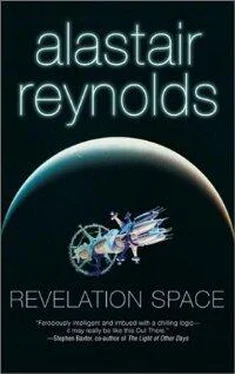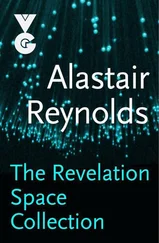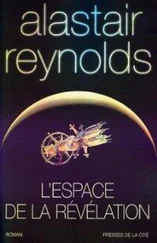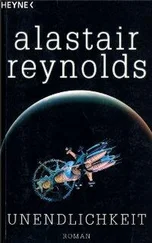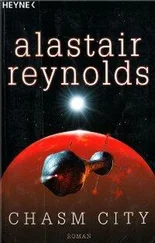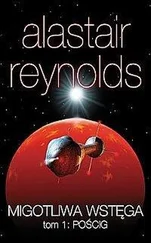“Hence the Fermi paradox,” Pascale said.
“The what?” asked Khouri.
“The old dichotomy between the relative ease of interstellar flight, especially for robotic envoys—and the complete absence of any such envoys turning up from non-human cultures. The only logical conclusion was that no one else was around to send them, anywhere in the galaxy.”
“But the galaxy’s a big place,” Khouri said. “Couldn’t there be cultures elsewhere, except that we just don’t know about them yet?”
“Doesn’t work,” Volyova said emphatically, Pascale nodding in agreement. “The galaxy’s big, but not that big—and it’s also very old. Once a single culture decided to send out probes, everyone else in the galaxy would know about it within a few million years. And the galaxy happens to be several thousand times older than that. Granted, several generations of stars had to live and die before there were enough heavy elements to sustain life, but even if machine-building cultures only arise once every million years or so, they’ve had thousands of opportunities to dominate the entire galaxy.”
“To which there have always been two answers,” Pascale said. “Firstly, that they are here, but we just haven’t ever noticed them. Maybe that was conceivable a few hundred years ago, but no one takes it seriously now; not when every square inch of every asteroid belt in about a hundred systems has been mapped.”
“Then maybe they never existed in the first place?”
Pascale nodded at Khouri. “Which was perfectly tenable until we knew more about the galaxy, which begins to look suspiciously accommodating of life, at least in the essentials; what Volyova just said—the right types of stars, and the right kind of planets in the right places. And the biological models were still arguing for a higher occurrence rate, right on up to intelligent cultures.”
“So the models were wrong,” Khouri said.
“Except they probably weren’t.” Volyova was speaking now. “Once we got into space, once we left the First System, we began to find dead cultures all over the place. None had survived until much more recently than a million years ago, and some had gone out a lot earlier than that. But they all pointed to one thing. The galaxy had been a lot more fecund in the past. So why not now? Why was it suddenly so lonely?”
“The war,” Khouri said, and for a moment no one spoke. The silence was only interrupted when Volyova began speaking, softly and reverently, as if they were discussing something sacred.
“Yes,” she said. “The Dawn War—that was what they called it, wasn’t it?”
“I remembered that much.”
“When was this?” Pascale asked, and for a moment Volyova sympathised with her, caught between two who had been vouchsafed glimpses of something extraordinary, and who were less interested in adumbrating the whole of it than in exploring each other’s ignorances, shoring up each other’s doubts and misconceptions. But Pascale knew none of it; not yet.
“It was a billion years ago,” Khouri said, and for a moment Volyova let her speak without interruption. “And it sucked up all those cultures and spat them out in shapes and forms a lot different to the ones they’d had when they went in. I don’t think we can really understand what it was about, or who or what exactly survived it—except that they were more like machines than living creatures, although as far beyond anything we can envisage as our machines are beyond stone tools. But they had a name, or they were given it—I don’t really remember the details. But I do remember the name.”
“The Inhibitors,” Volyova said.
Khouri nodded. “And they deserved it.”
“Why?”
“It was what they did afterwards,” Khouri said. “Not during the war, but in its aftermath. It was like they subscribed to a creed; a rule of discipline. Intelligent, organic life had given rise to the Dawn War. What they were now was something different; post-intelligent, I guess. Anyway, it made what they did a lot easier.”
“Which was?”
“Inhibition. Literally: they inhibited the rise of intelligent cultures around the galaxy, so that nothing like the Dawn War could ever happen again.”
Volyova took over now. “It wasn’t just a case of annihilating any extant cultures which might have survived war. They also set about disturbing the conditions which could lead to intelligent life ever arising again. Not stellar engineering—I think that would have been too great an interference; too much an act which contradicted their own strictures—but inhibition on a lesser scale. They could have done it without tampering in the evolution of a single star, except in extreme cases—by altering cometary orbits, for instance, so that episodes of planetary bombardment lasted much longer than the norm. Life probably would have found niches in which to survive—deep underground, or around hydrothermal vents—but it would never have become very complex. Certainly nothing which would threaten the Inhibitors.”
“You said this was a billion years ago,” Pascale said. “And yet we’ve come all that way since then—-from single-celled creatures right up to Homo sapiens . Are you saying we slipped through the net?”
“Exactly that,” Volyova said. “Because the net was falling apart.”
Khouri nodded. “The Inhibitors seeded the galaxy with machines, designed to detect the emergence of life and then suppress it. For a long time it looked like they worked as planned—that’s why the galaxy isn’t teeming today, although all the preconditions look favourable.” She shook her head. “I sound like I actually know this stuff.”
“Maybe you do,” Pascale said. “In any case, I want to hear what you have to say. All of it.”
“All right, all right.” Khouri fidgeted in her acceleration couch, doubtless trying to do what Volyova had been doing for the last hour: avoiding putting pressure on the bruises she had already gained. “Their machines worked fine for a few hundred million years,” she said. “But then stuff started to go wrong. They started failing; not working as efficiently as intended. Intelligent cultures began to emerge which would have previously been suppressed at birth.”
There was a look on Pascale’s face which showed that she had just made a connection. “Like the Amarantin…”
“Just like the Amarantin. They weren’t the only culture to slip through the net, but they did happen to lie close to us in the galaxy, which is why what happened to them has had such an… impact on us.” Volyova was doing the talking now. “Maybe there should have been an Inhibition device keeping a close watch on Resurgam, but that one either never existed or stopped working long before they emerged to intelligence. So they ascended to civilisation, and later budded off a starfaring sub-species—all without attracting the attention of the Inhibitors.”
“Sun Stealer.”
“Yes. He took the Banished with him into space—changed them biologically and mentally, until they had little but their ancestry and language in common with the Amarantin who had stayed at home. And of course they explored, reaching out into their solar system, and later to its periphery.”
“Where they found…” Pascale nodded at the image of Hades and Cerberus. “This. Is that what you’re saying?”
Khouri nodded in agreement, and then began to explain the rest; what little there was to relate.
Sylveste fell and fell, and in his falling he hardly bothered to note the passing of time. Finally there came a point where more than two hundred kilometres of the shaft reached above his head; barely a few kilometres lay below his feet. Twinkling lights shone below, arranged into constellation-like patterns, and for an instant he entertained the idea that he had travelled much further than seemed possible, and these lights were actually stars, and that he was on the point of leaving Cerberus completely. But the thought died as soon as it had come to mind. There was something just a little too regular about the way the lights were aligned, just a little too purposeful; a little too pregnant with intelligent design.
Читать дальше
